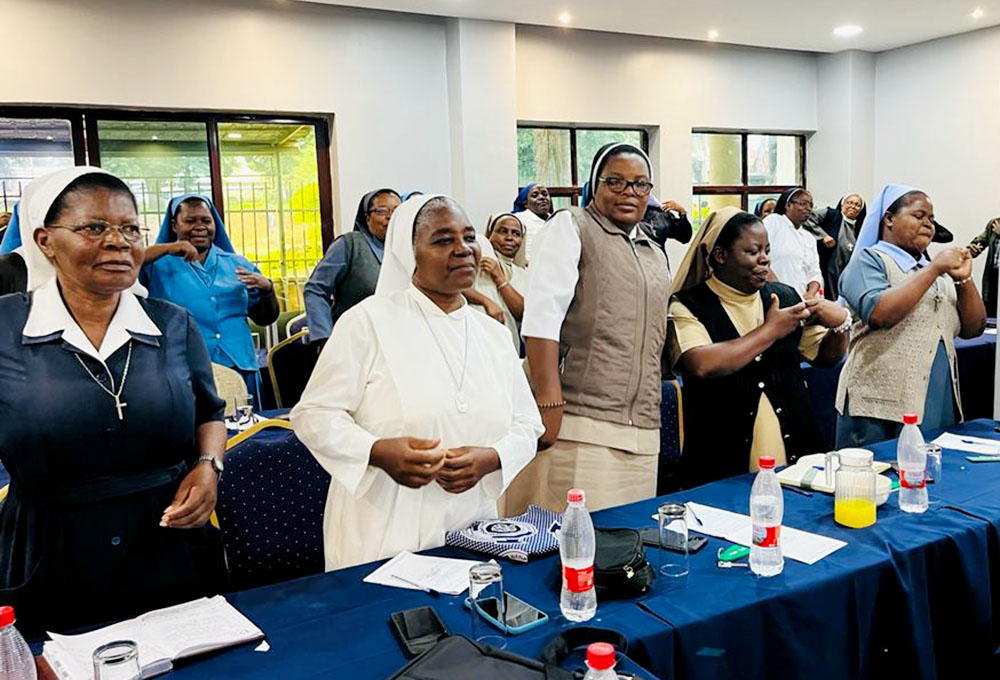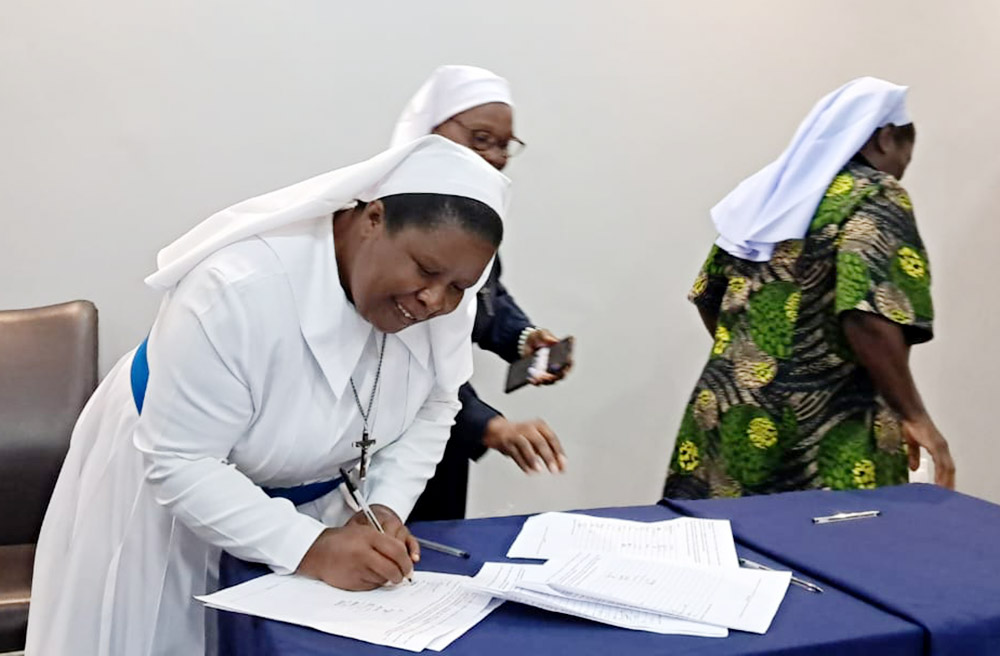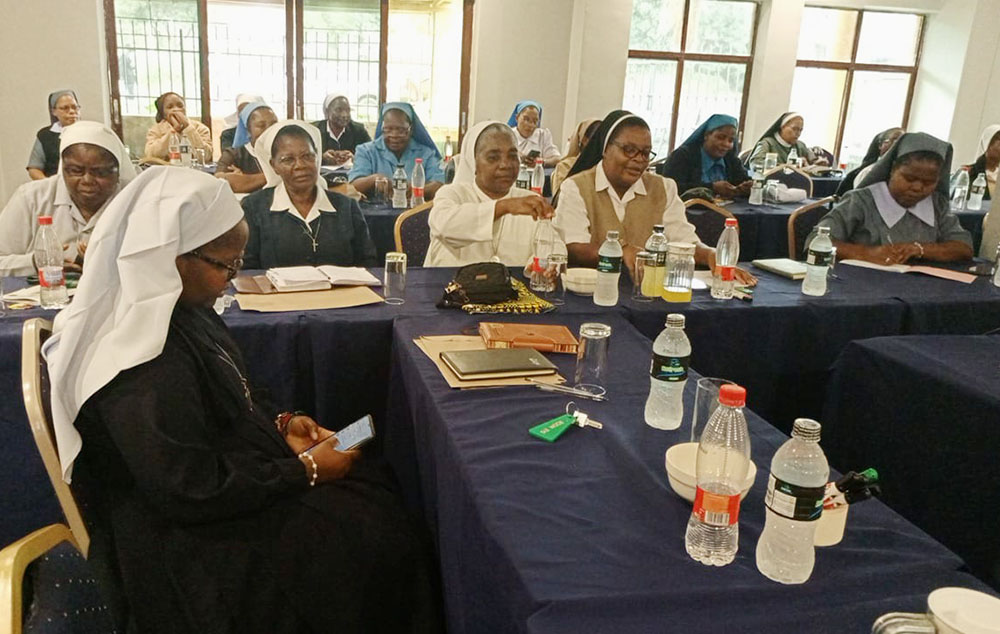
Religious sisters dance and exercise during an advocacy training in Lilongwe, Malawi's capital city, Jan. 17. The training was organized by the All-Africa Conference Sister to Sister and the Africa Faith and Justice Network to help sisters acquire skills to advocate for people affected by the cyclone that hit Malawi and other southern African countries in March 2023. (Eneless Chimbali)
Dozens of religious sisters and other participants gathered in Lilongwe, Malawi's capital, Jan. 15-19 to attend advocacy training to help those affected by Cyclone Freddy, which hit Malawi and other southern African countries in March 2023.
The training aimed to equip participants with the necessary skills needed to engage and prompt the government, donors and other stakeholders to alleviate the challenges that the most afflicted are experiencing.
The All-Africa Conference Sister to Sister and the Africa Faith and Justice Network organized the training, which attracted more than 35 participants from different African countries, the United Nations, the United States and Switzerland.
The training involved participants exchanging ideas on how best to assuage the immediate needs of those affected by the cyclone, train the affected communities on social and economic empowerment, and provide psychosocial support.
The cyclone hit Mozambique on March 11, breaking the record for being the longest tropical cyclone lasting more than five weeks. The torrential rain and flooding affected other parts of Africa, including southern Malawi, northeast Zimbabwe, Madagascar, and southeast Zambia. In Madagascar, figures show at least 17 deaths, while 183 people died in Mozambique, and at least 676 people in Malawi.
The cyclone destroyed crops, livestock, power lines, roads, bridges, markets and other infrastructure. The ravaging floodwaters of the cyclone washed away homes, displacing millions of people, the majority of whom are still living in the camps.
The sisters said the advocacy training idea came after they noticed a sluggish response from the government in helping those affected by the cyclone, especially in Malawi, the most affected country. During the training, the sisters noted that those affected had lost everything and urgently needed life-saving humanitarian assistance, including food, shelter, medicines, water, sanitation and hygiene.
Advertisement
"People on the ground need urgent help in everything. Nothing much is happening on the ground, and people are suffering," said Sr. Eneless Chimbali, a senior program officer for the All-Africa Conference Sister to Sister. "I want to appeal to the government, well-wishers, religious leaders and different stakeholders to put more efforts into assisting these survivors."
Chimbali, a member of the Servants of the Blessed Virgin Mary congregation, said the training had brought together different religious sisters, episcopal leaders, government representatives and advocacy groups from other parts of the world to "urge the Malawi government to act fast on the urgent needs of the people and ensure the necessary action is taken to address the current lack of basic needs for many of the displaced people."
"The sisters are working on the recovery process, but they need collaborated efforts to help survivors of the cyclone to resume normal lives effectively," Chimbali said. She noted that it's the reason the sisters had the training: to help them gain skills to lobby the government, donors and other stakeholders to donate basic needs and funds that will provide families with urgent life-saving support.
Chimbali also encouraged various groups attending the training to advocate for justice for the people affected by the cyclone.

Religious sisters write down advocacy messages and commitments during the advocacy training in Malawi, Jan. 17. The sisters said they are ready to use the skills they will acquire during training to help advocate for the rights of people affected by the cyclone in Malawi. (Eneless Chimbali)
"As religious sisters and other stakeholders here, we cannot keep quiet seeing people affected by cyclones struggling to rebuild their lives because this is our mission and charism," she said. "Let's break the silence to the malpractices that derail progress, especially in Malawi."
The Africa Faith and Justice Network's Sr. Eucharia Madueke, a member of the Sisters of Notre Dame de Namur, said the training the sisters received in practical advocacy included "building the sister's confidence and enabling them to speak and act on issues of concern, to engage structures of injustice that oppressed the people they serve, and to assist them in establishing a network of sister advocates to tackle structures of injustice in their countries."
Madueke, who coordinates the women's project of the Africa Faith and Justice Network, said the training was part of the sisters' effort to tackle an unjust framework that the cyclone disaster exposed in Malawi and other countries.

Religious sisters gather in Lilongwe, Malawi, to attend an advocacy training that aimed to equip the sisters with skills to better engage the government in addressing the needs of people affected by Cyclone Freddy, which hit the nation in March 2023. (Eneless Chimbali)
"AFJN was invited because we have had success in various countries helping the sisters expand their mission of service to the people, including advocating for structural changes training," she said. "The training will help the sisters have the skill to hold the government accountable, given that the government's responsibility is to be proactive in providing care for the citizens in times of disaster."
Meanwhile, sisters who attended the training vowed to pass on the knowledge to other sisters who could not attend.
The Association of Women in Religious Institutes of Malawi chairperson, Sr. Agnes Cecilia Jonas, said she would implement all the skills she had learned from the training and use her current position at the association to ensure that sisters' congregations that were not present get the chance also to learn and help the people they serve.
"I urge the sisters who have attended this training to utilize the enhanced knowledge and skills to benefit marginalized communities affected by the disasters," said Jonas, the superior general of Teresian Sisters. "The training will help us better serve the people and deal with the government and the relevant stakeholders in having them promptly address the needs of people."






